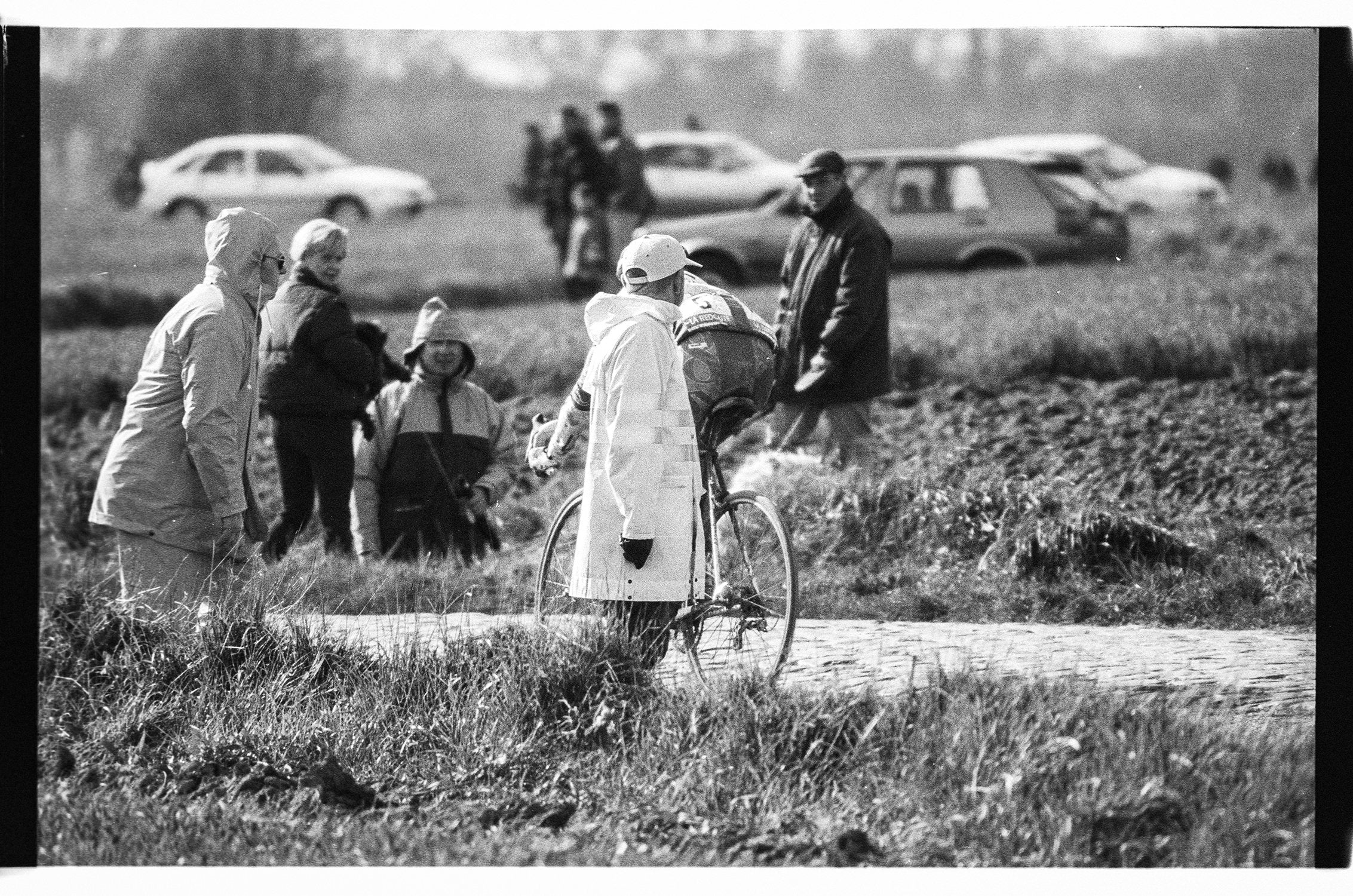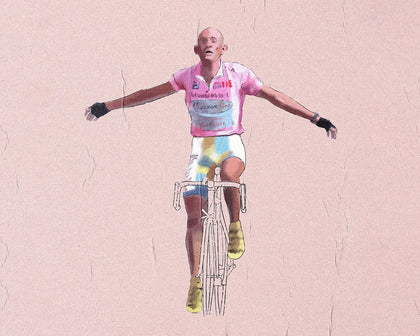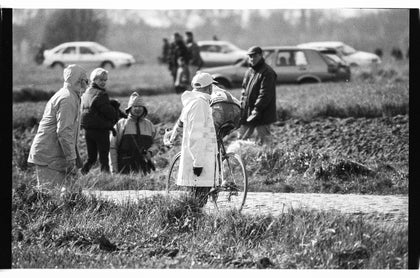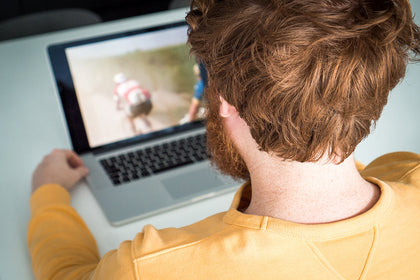
Heaven of the North

Heaven of the North
Words by Thijs Delrue
The doorbell rings. 'They're here! Who's going to open the door?' I put down my scissors and sprint to the front door on my socks. 'Hey Thijzeman, is your list ready yet?'
Every year, on the second Sunday of April, that is the first question I get when the family from the Campine descends on Rekkem, in the far west of Flanders, near the French border. 'I am working on it', I reply with a broad grin, then I greet my aunts, uncle, cousins and companions with a kiss. That is how it goes in our family.
I devote myself once again to my holy task: carefully cutting the participants' list - with shirt numbers, of course - from the newspaper. That newspaper is not De Standaard, the one we subscribe to at home because it happens not to be the standard for sports. One meagre page is what I have to make do with every day! No, on sporty public holidays, I walk along the garden path, behind the neighbours, to my aunt on Rekkem square. She reads Het Volk and is happy to give the sports section to her cycling-crazy nephew. The same happened this morning.

Once the list is cut out, I search the haystack that is my father's desk for a sturdy piece of cardboard. The back of one of his large brown envelopes can serve perfectly as reinforcement. With a half-dried up tube of glue - it has probably been a full year since anyone used it - I stick the list to the cardboard. Now all that remains is to mark the favourites with a yellow marker pen to memorise their shirt numbers.
'And what if it rains?' asks my cousin, who has suddenly appeared behind me. He's right. When, as a little kid, I stood on automatic pilot clapping for Kuiper, Kelly, Madiot, the old Moser, and later for Eric Vanderaerden, the water came pouring down. The ditches along the cobbled roads crumbled, the mud poured over the stones, and the dirty creatures that carefully balanced their way out of the bends were barely recognisable. But that did not spoil the fun. Following in the footsteps of grandad and dad, we cheered each other on with equal enthusiasm. And if I did get cold, I found solace in the prospect of a steaming Cup-a-Soup after our homecoming. With extra celery salt!
It has been more dry than wet in recent years, and no rain is forecast today either. But the heavens are turning an even, unfathomably white colour, so it's better to be safe than sorry. My heartfelt dislike of tinkering is hardly noticeable when I have a higher purpose in mind: I secretly cut up one of my father's folders and stretch the plastic sheet over the cardboard. A few staples should keep everything in place. My waterproof list of participants is ready.
***
The turkey legs with mummy's delicious tangerine sauce shake my stomach. Eaten too fast? Nerves? Or am I, in fact, physically sympathising with the hooting and hollering riders on television?
'How far is it to the forest?' is the sound from the banquet table.
'Another thirty kilometres,' I reply from the edge of my seat.
The signal for my father to take action. He gets up and goes upstairs. Five minutes later, I can hear him growling and cursing in the background. To his annoyance my brother Tom's portable radio cassette player is in even worse shape than last year. When my father opens the device to put in new batteries - everyone has their responsibility today - he notices that the outside and the inside of the device have become entirely coroded because of the steam in the bathroom. That is the price we are prepared to pay to listen to Midnight Oil or The Cure from our hot bath.

The contacts are apparently not damaged, because suddenly the radio comes to life. But now, the most challenging part of father's mission awaits: converting the metallic squeaks and grumbles into intelligible cycling commentary. It won't be easy to find the right frequency, as the antenna has been cut in half over the past twelve months. It broke off. How? That is a mystery. The culprit has not yet come forward. In any case, I plead not guilty.
***
‘Yes! The Trench of Wallers-Arenberg!’
The whole family leaves the coffee and the biscuits for what they are and clings to the television. For a while, anyway. Because as soon as the last rider has finished that damned stretch, everyone gets up, and exciting questions fly through the living room.
'Who is riding with whom?'
'Do we need to take an umbrella?'
'And boots?'
'Dad, don't forget the radio.'
On the way, the car radio keeps us informed of the course of the race. And just like every year, Tom does his imitation of sport's commentator Jan Wauters' trembling voice on the back of the motorbike. 'Acceleration of Vanderáérden' - Tom got stuck in the eighties – 'and Bontempi responds!' he improvises, beating his chest. Some things you never get tired of.
Dad is a GPS before the term was invented. Whether we are in the south of France, Friesland, England or Flanders, he finds his way around blindly. One exception: the route to the cobbled road of Hem, where our annual rendezvous with the Hell of the North takes place.
The express road to Mouscron, under the tunnel next to the swimming pool, a little further on the A17 towards Tournai, exit 1, straight through Templeuve towards the French border village of Willems... So far, so good. But then, in the centre of Willems, doubt strikes. Right or left?

A few years ago, he made his first mistake there, much to the family and friends' delight in his wake. He, whom everyone believed to be infallible when it came to orientation, had lost his way. The next year: again. The same fork was his downfall. Even more, ridicule was his share.
The tension is palpable. Everyone in the cars feels that a new defeat may be the straw that will break the camel's back. That schadenfreude will not go down well. Right or left? He makes a choice against his instincts. A hundred metres further on, we are sure: we are on the right road! Three cheers for this. The GPS has been reinstated.
***
We park the cars in the hamlet of Robigeux, and a hundred metres further, we enter the last real Secteur pavé of Paris-Roubaix. The one in Hem. The cobblestones are in bad shape, but on either side of the rounded back - the passing cars' wheels barely touch the ground - is a narrow strip of asphalt that the riders are happy to use.
We walk on to 'our' spot. A succession of two rectangular right-left bends where the riders have no choice but to cross the cobbles to take the fastest route, from inside bend to inside bend. It's not without danger when it's wet, but I've never seen any falls here.

There is not much myth or legend to be found here, although Kuipers' tyre came off the rim somewhere on this road on his way to victory in 1983. (And later, but I don't know this yet, Museeuw will be deprived of a fourth victory a few hectometres further on). But the advantages of this location are endless.
First of all, there are never many people, which is always good when the publicity caravan passes. It is not as monumental as during the Tour de France, but my dad, who was conceived during the Second World War, never looks a gift horse in the mouth. Just last year, he dove into the ditch like an accomplished goalkeeper to get his hands on a porte-cleetje (West Flemish for 'key ring') of La Voix du Nord. Proudly he handed the trinket to my mother, who, sighing and rolling her eyes, threw it in the plastic bag full of sponsored caps, beach balls and ballpoint pens. Ready to gather dust in the attic for twenty years.

Second: all around us, the fields and meadows stretch out as far as the eye can see, so that we catch sight of the helicopters approaching half an hour in advance. So we know pretty much how long we have to wait for the leaders. My father tries to find out who they are with the help of our dilapidated radio with an amputated antenna. Fortunately, we are still close enough to Belgium to catch snippets of Radio 1.
'Ballerini and Duclos-Lassalle are riding in front,' he echoes the reporting for us.
'And behind them Museeuw, Ludwig, Van der Poel and... Van Hooydonck.'
Our Campine company goes crazy. Edwig Van Hooydonck comes from the neighbourhood of Wuustwezel. A stone's throw from Brecht, the homeland of my mother's side of the family. My heart, too, starts beating faster for the copper champion.
'How far behind are they?' everyone wants to know.
'Almost two minutes.'
Euphoria gives way to resignation.
And so I come to point three. In Hem, the race has usually more or less been decided. Whoever is in the lead here - solo or in a group - is in any case eligible for the win. Also, the participants' group has so torn apart that I can gaze at dusty or smeared faces and shrugging corpses on saddles for more than half an hour. What a difference from the ten-second whooshing passed during the flat stages of the Tour we have already witnessed.
Now the helicopters come very close. The bravest among us jump over the ditch to the narrow strip of grass beside the road. The rest stay on the edge of the fields, a little higher. It can't be long now.
***
Behind us, a helicopter descends to just above the ground. I wave at the camera, which I might even be imagining, and then it's time to focus. A first cloud of dust on the horizon. Duclos and Ballerini have started our lane. Honking cars flirt with my toes, motorcyclists tear dangerously through the bends.
'Come on, Gilbert! Come on, Franco!'
Two minutes later. A second group. Four silhouettes.

Is he still there?' I recognise the Tall One from Gooreind from afar.
'Yes, he's still there.'
'Edwig! Edwig! Edwig! Edwig!'
Museeuw, even though he is a West-Fleming, has never been a hero in the Delrue house. The rest of the fragmented bunch passes in groups of fifteen men at the most, which allows me to recognise most of the riders and rattle off their names loudly - Bauer! Nijdam! De Wolf! Redant! Frison! Ghirotto! That way, the race-illiterate bystanders know for whom they are cheering. In return, they - especially my mother and sister - try to recognise and remember as many shirt numbers as possible so that we can consult my watertight list of participants between two groups.
'Wilfried Peeters was also among them.' 'They are entering the velodrome', my father suddenly shouts, the radio pressed against his ear. Everyone gets as close to him as possible. Photo finish! Duclos or Ballerini? 'The Italian throws his hands in the air with conviction', it sounds. 'Ballerini a gagné', we shout to the next line of riders that rushes past us. A teammate from GB-MG cheers up, someone from GAN shakes his head in disappointment.
'No, they were wrong,' dad announces a little later.
'It is Duclos who has won!'
'Didn't he win last year as well?' asks my mother, who is immediately congratulated by more ignorant relatives for so much perspicacity.
I am genuinely happy for the old Frenchman but I feel guilty for the false information that I just passed on. Unworthy of a budding sports journalist ...
***
On the way back to our cars, we are occasionally startled by the shrill whistle of a policeman. Singles, sometimes in pairs or trios, who stayed behind, slalom their way between the spectators walking home. Fortunately, we show the necessary respect for these heroes who want to reach the velodrome at all costs. Even if they are too far behind to be included in the official results, they will be able to tell their grandchildren with good reason that they survived Paris-Roubaix.
At the beginning of the cobbled section, we traditionally stop for a moment. There is always someone who wonders why we have not returned home yet. And my father always has the same answer: 'As long as the broom wagon has not passed, there is at least one more rider on the way.'

The policeman who has to keep the road clear confirms this. So we wait. And we dig out - as we do every year - that one anecdote. Perhaps my first conscious memory of the race. It was at this spot. It was raining, it was windy, the riders all looked worn out. At least forty-five minutes had passed since the leader came by, but another figure appeared in the distance. Despite the mess, the black checkerboard pattern was recognisable on the no longer so white background—a rider from Peugeot.
The most stubborn spectators, among whom we have always belonged, gave him loud applause and the best-intended encouragement. The man in question responded with a waving fist and some French expletives. Something with 'foutez' and 'gueule'.
He would soon leave Hell behind. That afternoon, the gateway to Heaven opened for me.
Thijs Delrue
As an author / ghostwriter of sports and other books, Thijs Delrue prefers authentic portraits. He wrote the biographies of Sven Nys, Paul Van Den Bosch, André Meganck and Stig Broeckx, among others. He also publishes columns on Facebook and in magazines under the pseudonym De Koperen Kogel (The Copper Bullet).
Follow him on Facebook - De Koperen Kogel - or view an overview on his website.


